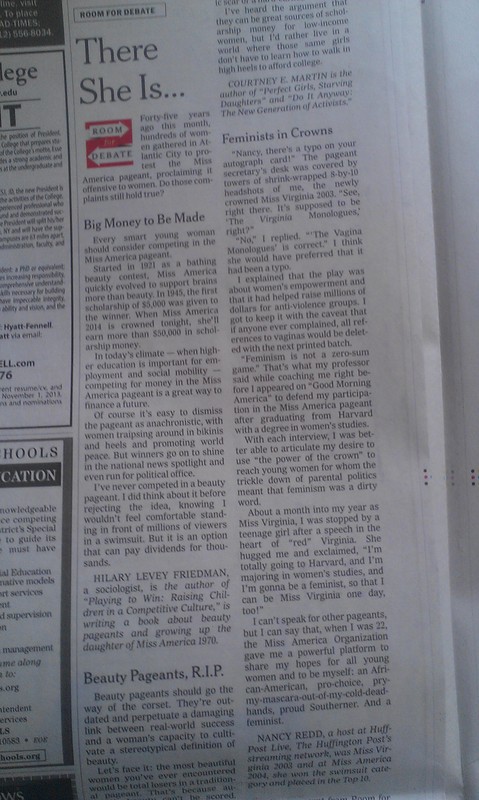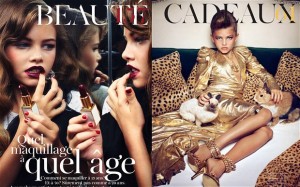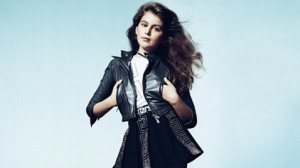It's been a little over two weeks since Nina Davuluri was crowned Miss America 2014. After an initial media burst, interest has faded a bit-- though she is still in the public eye more than I might have expected. Also, thanks to the French ban on child beauty pageants, a proposed ban in Quebec, and serious protests at Miss World, beauty pageants have remained very much in the public conversation. The 2014 Miss America Pageant got a lot of attention this year because of the return to Atlantic City and a September pageant date. A few contestants, like Miss Kansas, got the lions share of pre-pageant media attention (thanks to her tattoos, military background, and archery talent-- though no one but me seemed fascinated by her shade of bleached blonde hair that basically blended with her skin tone...). Miss New York, Nina Davuluri, got some negative press attention after a NY Post article quoted her as saying that Miss America 2013 (also from New York) was "[expletive] fat." Here are more details on that, and my thoughts on the controversy, published on Yahoo! Shine.
Because of the return to AC, Miss America even got attention from the paper of record's editorial page. I was one of six participants in a New York Times Room for Debate forum on whether Miss America is bad for women. You can read my piece (and the others) by clicking here. Was also a total bucket list moment when mine was one of three excerpted in Sunday's Review section!
Most of the comments-- both positive and negative-- were extremely thoughtful. While I can't respond to all of them, I did want to point out two facts as they directly relate to what I wrote and to several commenters. The first is that in addition to scholarship money Miss America actually earns a salary, which is six figures. Each state queen also earns appearance fees. If a winner never goes back to school (or has no student loans) she never sees that scholarship money, but she did in fact earn a nice chunk of pocket change for her year. Second, many women who never win a state title still earn a significant amount of scholarship money. For instance, when I judged Miss NJ, one woman who didn't even make Top 10 at the pageant still earned several thousand dollars in scholarships (note, NOT cash prize) thanks to her service and academic performance. At each local even swimsuit and talent winners earn scholarships that start at $100, or even $50, but the rewards add up each year.
Due to the NYT article I also had the pleasure of appearing on Melissa Harris-Perry on MSNBC the day of the Pageant, along with a former Miss America and some critics. Here I am sitting next to Soledad O'Brien (let's just say that in general it was a bucket list Sunday!):
 You can watch the clip by clicking here, or watching below, and if you do you will see I tried to give historical and social context to where Miss America is today.
You can watch the clip by clicking here, or watching below, and if you do you will see I tried to give historical and social context to where Miss America is today.
Visit NBCNews.com for breaking news, world news, and news about the economy
In the second segment I didn't get a chance to give my point of view about young girls competing, which is why Prof. Harris-Perry asked me to write this follow-up piece on why I never competed as the daughter of a former Miss America.
(Lest you think I am uncritical of Miss America as well, think again. For instance, check out this piece I wrote that ran at The Forward about why it's hypocritical of Miss America to say it celebrates diversity when it was held during the High Holy Days for Jews, eliminating a segment of the population from competing.)
After leaving the MSNBC studios I hustled back to Atlantic City to see the live event. Here I am in front of the stage in Boardwalk Hall before the televised portion began:
Being in the audience is a bit like being in the audience at the Super Bowl (not that I've ever done that!); you would likely have a better view at home, but the atmosphere is great fun. In the live audience you don't get to see many of the "video packages" seen at home-- though we did get to see the taped opening number and hear the contestants' state intros (I admit I totally laughed out loud when Miss Vermont announced she was lactose intolerant).
It's also fun during commercial breaks, with people like Dena Rizzo keeping the audience entertained and happy. This also explains why I didn't make time to Tweet or anything-- it's all part of the show.
While I obviously missed the 20/20 special (though I watched it the next day), I knew all about Miss Florida's injury. I have to say that during her talent the entire audience was behind her and it was a special uplifting moment when she twirled so well (and interesting how people reacted by booing after the emcee cut off her [bad] on-stage answer). Plus, who can't get behind a BEDAZZLED knee brace?!
Even during the live pageant I just hated seeing the eliminated contestants forced to sit on stage and watch, I DETESTED the way talent was handled as usual (not letting contestants know beforehand so they can be properly prepared to do their best on national TV), and I disliked the constant talk about food and binging after the pageant.
Overall it was a strong Top 5 and could have gone several different ways, but when Miss New York was crowned I immediately thought: 1) Third time ever for back-to-back state winners, and 2) First ever Indian-American winner, how cool. It wasn't until the next day that I heard about the horribly racist online reaction, something that didn't even enter my mind when I headed off to visitation. But it did give rise to good articles (like this one) and an interesting way to welcome Vanessa Williams (also Miss Syracuse, New York, and America) back into the Miss America fold.
Miss America also got good ratings, its best in years, which likely helps explain the more sustained media attention. Also, the fact that beauty pageants have remained part of the media conversation every week since. The week after, France made headlines after passing a bill that included a ban for all pageants offered to girls under age 16 (this has been talked about for the past year, as I wrote about previously). For my thoughts on why this would never happen in the US, read my comments in USA Today and see a bit of my thoughts on why regulation is important at Al-Jazeera English. This legislation in French has led to discussion, but no action in Quebec (for my thoughts in French, click here) and Ireland.
One place where pageants are held, but not without controversy is Bali (and other Muslim countries)-- the site of the Miss World competition this year. After death threats, etc., the exact location was moved and a winner was chosen, and this controversy kept pageants in the news LAST week. On why pageants are inherently political, see my thoughts in this TODAY Style piece on how pageants have in fact always been political, and will remain so particularly in other parts of the world.
Who knows what pageant controversy next week will bring! Any guesses?!




